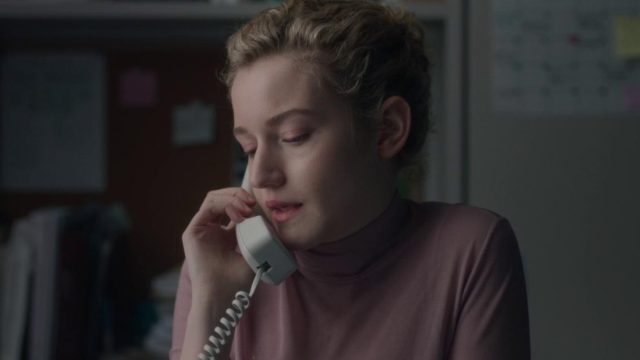Kitty Green’s The Assistant–like her follow-up film The Royal Hotel–is a kind of psychological horror where the protagonist has to play a constant guessing game about how and when the danger will materialize. The Royal Hotel eventually makes its threats more physical and overt; here, the wear-and-tear on overworked assistant Jane (Julia Garner) is more psychological. It is, deliberately, less actionable and harder to pin down. The high-pressure production company Jane works for, with its thrum of alternately low- and high-key sexual harassment and belittling, is designed to make people like her doubt themselves and their instincts, designed to make them accept whatever treatment they’re given.
Jane’s unnamed boss is an off-screen specter, visible only in silhouette and a few lines of an email, audible only through muffled phone calls where he viciously demeans her. The “revelation” that he’s in the habit of leveraging his power to get sex disturbs Jane, but it’s not exactly shocking. The film locates her naivete, such as it is, very precisely. She knows enough about the world to immediately understand why her boss has suddenly created a junior assistant position for a beautiful, unqualified young woman and, oh yeah, put her up at a luxurious hotel, but she still believes that the HR of the company that man runs is going to be interested in this news and supportive of her coming to them about it. (Matthew Macfadyen is a one-scene wonder here as an HR representative who weaponizes a kind of faux-clueless literalism before brutally giving up any pretense that he’s here to do anything but prop up the status quo.)
Honestly–and this is a point in the film’s favor–Jane’s boss’s sexual misconduct is less horrific than some of the other stories that have come out of the #MeToo movement. It’s unquestionably bad, but reality has given us worse. And like I said, that’s good: The Assistant is interested in what it’s like to be adjacent to, and to some degree complicit in, exactly the kinds of things that get dismissed as not that bad. Jane herself never suffers any unwanted advances or implicit quid pro quo offers; she just has to work in an office where everyone knows they’re happening, where the staggering number of women who have gotten fucked on a given office couch is a punchline. It’s background radiation, and as she works from before sunup to long into the night, she has to ask herself: how much of this can she tolerate?
There’s an extent to which all this would be survivable and manageable, even for a sensitive and ethical young woman like Jane, if it weren’t for everything else. The hours, as stated, are draining and unreasonable; the demands on Jane’s time and attention are impossible. The movie takes place over the course of one excruciatingly long day, and it took me a bit to realize that, because surely all this could not be happening during one work day, but no, Jane still wearing the same clothes isn’t a continuity error. Her life is nothing but grinding continuity with essentially no break. When she “makes a mistake”–by, for example, not adequately putting off an irate mistress, or daring to talk to HR–her boss is on the line within seconds, spitting venom at her: “Am I yelling? No. Because you’re not someone who’s even worthy of that.” He eviscerates her by phone; she’s forced to type out her apologies to him via email. The only thing “on the record” is that she’s so sorry, she made a mistake, she never should have interfered, she’s so happy to be here. You can already imagine the future where these are read aloud and used against her.
This is essentially the Julia Garner show, and Garner does an exceptional job, playing Jane as a smart, highly competent woman who is already frayed almost to the breaking point, whose weariness is soul-deep at this point, and who just wants someone, anyone, to tell her that she’s not overreacting, this is wrong. Jane’s position at the bottom of the office ladder leaves her both exploited and vulnerable, and she’s developed such a heartbreaking loneliness that she seems genuinely rocked back by a simple offer to join her often-shitty frat bro coworkers for a drink. Worse, she looks genuinely affected by–or at least curious about–the lightly substantiated claim that her boss is really doing all this because he respects her and is challenging her to be better. The movie ends with Jane finally at the end of her long day, and we could imagine her quitting … but we could also imagine her coming back and slowly accepting the toxic culture surrounding her and buying into it. After all, it’s not so bad, is it?
The Assistant is streaming on Max.

